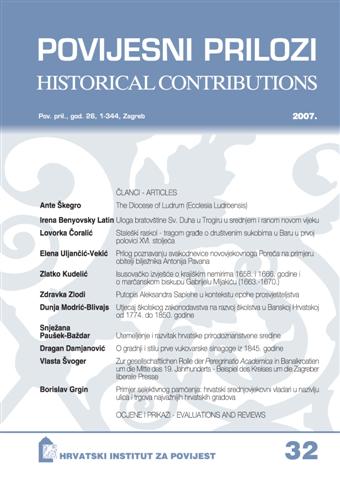Isusovačko izvješće o krajiškim nemirima 1658. i 1666. godine i o marčanskom biskupu Gabrijelu Mijakiću (1663.-1670.)
A Jesuit report about riots at border line in 1658 and 1666 and Gabrijel Mijakić bishop of Marča (1663-1670)
Author(s): Zlatko KudelićSubject(s): History
Published by: Hrvatski institut za povijest
Keywords: Military Border; Vlachs; Jesuits; Zagreb dioecese; Vienna court; Catholicchurch; orthodoxy; church union; Marča diocese; Patriarchate of Ipek; Gabrijel Mijakić; Pavao Zorčić
Summary/Abstract: In this article author presents a report of an anonymous Jesuit. This report about frontiers’ mutinies in 1658 and 1666 is a valuable historical source that contains important information about participation of the Uniate bishop of Marča in these events, and especially about aforementioned Gabrijel Mijakić. According to this report all the bishops of Marča in the period between 1630 and 1670 were responsible for all the uprisings of frontiers because they were political representatives of all the frontiers and protectors of their privileges commonly known as Statuta Valachorum, which were kept in the monastery of Marča. Since bishops often interpreted these privileges vaguely, they in fact encouraged frontiers’ mutinies. Moreover, they were guilty for the failure of the church union because they did not accept Catholicism, though they formally accepted it only in order to gain an independent diocese. In fact they remained Orthodox believers and were subordinated to the patriarch of Ipek. The author of the report explicitly wrote that bishop Sava Stanislavić directly had encouraged uprising in 1658. By the same token, he witnessed that Gabrijel Mijakić indirectly supported Stefan Osmokurovć, who was the leader of the mutiny in 1666. Moreover, anonymous Jesuit claimed that Mijakić also gave shelter to the rebels after the mutiny was put down. However, this failure of the rebellion forced Mijakić to start spreading union among Vlachs, to organize Catholic schools for frontiers’ Orthodox youth. Finally, Mijakić also accepted to go to Rome to be formally appointed to his duty by pope, since he was so afraid when he saw in which severe manner mutiny was put down by Herberstein colonel of Kriûevci. In this report Petar Petretić bishop of Zagreb was evaluated as the most important person regarding the putting down the mutiny. Even before this mutiny Petretić was strongly against Mijakić’s appointment to the rank of bishop of Marča, since he was not a true Uniate. However, though Mijakić enjoyed support of some of the nobles from Slavonia, after he came back from Rome without pope’s inauguration archbishop of Kalocs and bishop of Zagreb officially requested his replacement and support of the military authorities. Unfortunately, soon after this request bishop of Zagreb died, and this prolonged the process of Mijakić’s imprisonment, especially since the War Council in Graz was not eager to fulfill bishop’s request. According to the report Mijakić himself provoked his imprisonment in September 1670, since he encouraged clergy to attack parish priest Pavao Zorčić, who was protégé of deceased bishop Petritić. Now Mijakić was replaced and new bishop of Marča became Pavao Zorčić, who was not supported neither by clergy neither by Vlachs. This opposition provoked military authorities to imprison several monks. However, during his time Zorčić constantly met opposition of Orthodox monks and Vlach who did not want to accept him as
Journal: Povijesni prilozi
- Issue Year: 2007
- Issue No: 32
- Page Range: 119-182
- Page Count: 73
- Language: Croatian

